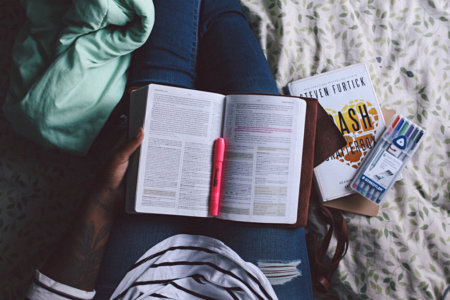
Constantly wake up feeling like death? Straining your jaw yawning throughout the day? Eyebags that seem like permanent fixtures on your face? This article is for you.
It’s no secret that most university students struggle with getting enough sleep.
Approximately 70% of college students get less than 8 hours of sleep per night. Around 68% of female students and 54% of male students frequently complain about insufficient sleep, and the average student gets only six hours of sleep per night.
It’s common for most people to understand the implications of less sleep, but miraculously, they still struggle with developing better sleeping habits.
So questions like how to get more sleep or how to build a better sleep schedule arise.
But first, what exactly happens when you don’t get enough sleep?
 Perhaps you need an alarm clock this big to maintain a better sleep schedule.
Perhaps you need an alarm clock this big to maintain a better sleep schedule.
Effects of staying up late as a student
A recent study by Georgia State University states that students don’t get nearly as enough sleep as they require. Eventually, this poor sleep quality negatively impacts higher cognitive skills — also known as executive function — and working memory.
Another study shows that a lack of sleep often impacts physical health, mental wellbeing, and the ability to do daily activities; plus, it can be a predictor of lower grades.
If it continues on, sleep deprivation can also increase the risk of certain health conditions, such as bad metabolism, insufficient hormone production, weight gain, and even affecting your cardiovascular system.
Even if you get more than six hours of sleep, going to bed at 5AM and waking up in the afternoon is still unhealthy. You may experience fatigue, brain fog, an inability to concentrate, irritability, or lack of focus.
And no, you can’t sleep it off during the weekend. Many students believe that sleep debt can be made up on the weekend by sleeping in for 12-15 hours, but it’s a massive misconception.
Discovering how to get more sleep isn’t enough — it’s also about the quality of sleep you’re having.
Deep sleep and REM sleep
There are actually five stages of sleep that vary in levels and end with REM (rapid eye movement) sleep.
- Stage 1: Your eyes still move behind your eyelids, even if you’re asleep. This is a very light stage of sleep, and you can usually be woken by voices, noises, or any disturbance.
- Stage 2: You’ll be fully asleep and unaware of your surroundings. This is when your heart rate and breathing start to regulate, your body temperature goes down, and your eye movements slow or stop.
- Stage 3: A deeper sleep where your brain waves start to slow down. Your muscles fully relax, and your breathing slows even more. It’s difficult for someone to awaken from this stage, and if they do, they will feel extremely disoriented.
- Stage 4: Your body starts to go into repair. Your body tissue starts to repair itself, and hormones are released to help with growth and healing.
- Stage 5: REM sleep is the final stage, and it’s when we start to dream. Your eyes will move rapidly behind your eyelids and your breathing might quicken. Blood pressure and heart rates will spike, and your arms and legs will be “paralysed” so that you can’t act out your dreams.
REM sleep occurs about roughly 90 minutes into the sleep cycle, and you will continuously cycle through each of the stages throughout the night. The purpose of REM sleep is to stimulate the sections of the brain that are needed for memory and learning and help the brain store and sort information.
If you struggle with bad sleeping habits or patterns, it’s likely that you won’t reach deeper levels of sleep as frequently as you should.
So what exactly can you do to get more REM sleep?
 Do dogs dream?
Do dogs dream?
How to get more sleep for sleep-deprived students
Light exercise
It’s a no-brainer that exercise makes you tired, but what people don’t know is that working out helps to produce melatonin – the hormone that makes you sleep better.
In scientific terms, exercise helps stimulate the pineal gland in the process of secreting melatonin. So skip out on the melatonin tablets or tea influencers often recommend, and try a more natural way to encourage melatonin production.
Relaxing exercises such as yoga and meditation, coupled with deep breathing, can naturally improve sleeping quality. Completing your workout at least two to three hours before bedtime will lead to better sleep.
Stop cramming
No, staying up all night before an exam will not magically help you pass your exam, especially if you haven’t been attending classes and have been skipping out on assignments and note-taking.
Lack of sleep will affect your cognitive skills and reduce your memory efficiency, so there’s no point in staying up for days before an exam only to forget it all as soon as you stare at the paper.
Instead, prepare well ahead of your exam instead of choosing to bum-rush before the finishing line. You might want to consider these nine revision tips to help you survive the exam period.
 Death from too much caffeine is possible.
Death from too much caffeine is possible.
Avoid coffee or energy drinks after 4 p.m.
Caffeine and sugar both reduce sleep quality and keep you from entering deep sleep. They are stimulants that cause your body and mind to be alert – after all, that’s the entire reason people drink coffee and tea.
On average, caffeine can stay in your body for up to five hours and take up to 10 hours to leave your system completely. Therefore, it’s best to avoid caffeine in the afternoon or at least refrain from drinking coffee six hours before bed.
So no matter how tempting that whipped mocha frappuccino or latte looks, save it for the earlier hours of the day.
Keep your bed comfortable
Avoid bringing your work into your sleep zone and abide by the rule that your bed is only meant for sleeping – or intimate activities, if any.
Once your body gets used to eating or working in a place where you normally sleep, it can become hard for the mind to relax and get good sleep. As tempting as it is to do your assignment while tucked into bed, it will affect you in the long run.
And, of course, try not to eat or snack in bed. When you eat in your bed, you train your body to associate your bed with food. This can make it difficult to fall asleep at night, even if you are not hungry. It helps prevent unwanted critters from showing up too.
 Did you know? Workspaces like offices and libraries often use blue lighting as experts believe it increases focus and concentration.
Did you know? Workspaces like offices and libraries often use blue lighting as experts believe it increases focus and concentration.
Lighting matters
Most of us sleep in the dark, but did you know that in the hours before bed, light plays a part in determining the quality of sleep you get?
Warmer hues of light are always preferable to cooler light. Compare a cafe’s light to the light in your lecture halls, perhaps. One makes you feel more comfortable, while the other keeps you awake.
The reason? Cooler colours, such as blue and white light, encourage attention and alertness. Warm red, orange, and yellow hues are better for preparing the mind and body for sleep. In fact, some experts recommend switching to warm lights after the sun goes down.
Avoid eating before sleeping
Eating or drinking too much before sleeping can make you feel uncomfortable as you are settling down into bed.
In fact, it’s recommended that you avoid eating a full meal two to four hours before bedtime. Eating too close to bedtime is related to gastroesophageal reflux disease (GERD), also called acid reflux.
This occurs when a person lies down right after eating and the contents of the stomach presses against the lower oesophagal sphincter, causing irritation and acid reflux. This leads to discomfort or pain, such as heartburn and nausea.
 How to get better sleep? Stop doomscrolling before bedtime.
How to get better sleep? Stop doomscrolling before bedtime.
Get off social media before bed
Stop scrolling TikTok, Instagram, and the likes.
You will never feel sleepy if there is constant light entering your eyes, especially if it’s blue light from your mobile phone. More so if it’s TikTok audios blaring in your ears right before you go to sleep.
That being said, there’s nothing wrong with a little social media or Netflix before bedtime. Just make sure that you put your electronics away 15-30 minutes before bedtime. Do your skincare, read a book, or spend some time stretching during that timeframe before you slip into bed.
Limit naps
Midday nap can be rejuvenating, but be sure you should limit yourself to only an hour or just an hour and a half. Banish the thought of taking that 4-hour nap after morning class, no matter how tempting it may be.
According to the National Sleep Foundation, the best nap lengths for adults are 20 or 90 minutes. Short naps – also referred to as power naps – will allow you to wake up feeling refreshed, energised, and alert. And the best part? They won’t affect your usual bedtime.
90-minute naps will allow you to cycle through all five sleep cycles, as you won’t wake up during deep sleep. These naps will leave you feeling thoroughly rested, more creative, more focused, and more physically energised.
Showering before bed
Research by the National Institute of Health suggests that bathing or showering before bed can help you unwind and sleep better. While most people suggest a warm bath, a cool one is also okay if you’re living in a tropical country.
Ideally, you should take a shower an hour or two before bedtime. It will help regulate your core temperature, which sends signals to your body that it’s ready to go into the sleep stages soon.
As a bonus, showering at night also ensures you will be cleaner when you go to bed, reducing the buildup of sweat, dirt, and body oils on your bedding. That’s a win for less laundry.
Maintain a schedule – and be serious about it
Perhaps the most important tip of all.
It’s vital to set a schedule and stick to it, like waking up at a set time and going to bed at a set time. Even if you go to bed later than usual, try not to exceed it by two hours at the most, and make sure to wake up at the same time as you normally would – yes, including weekends.
Why? Being consistent reinforces your body’s sleep-wake cycle. Changing your sleep dramatically can throw your body off from establishing a normal sleep routine.










